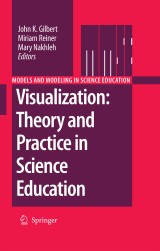Details

Visualization: Theory and Practice in Science Education
Models and Modeling in Science Education, Band 3
|
213,99 € |
|
| Verlag: | Springer |
| Format: | |
| Veröffentl.: | 05.12.2007 |
| ISBN/EAN: | 9781402052675 |
| Sprache: | englisch |
| Anzahl Seiten: | 328 |
Dieses eBook enthält ein Wasserzeichen.
Beschreibungen
<P>External representations (pictures, diagrams, graphs, concrete models) have always been valuable tools for the science teacher. The formation of personal, internal, representations – visualizations – from them plays a key role in all learning, especially in that of science. The use of personal computers and sophisticated software has expanded into the areas of simulation, virtual reality, and animation, and students now engage in the creation of models, a key aspect of scientific methodology. Several academic disciplines underlie these developments, yet act independently of each other, to the detriment of an attainment of what is possible. This book brings together the insights of practicing scientists, science education researchers, computer specialists, and cognitive scientists, to produce a coherent overview. It links presentations about the cognitive theory of representation and visualization, its implications for science curriculum design, and for learning and teaching in classrooms and laboratories.</P>
Visualization: An Emergent Field of Practice and Enquiry in Science Education.- Visualization: An Emergent Field of Practice and Enquiry in Science Education.- The Nature and Development of Visualization: A Review of what is Known.- The ‘Ins’ and ‘Outs’ of Learning: Internal Representations and External Visualizations.- Comprehending and Learning from ‘Visualizations’: A Developmental Perspective.- Seeing Through Touch: The Role of Haptic Information in Visualization.- The Design of Units and Courses Focused on Visualization.- Using External Visualizations to Extend and Integrate Learning in Mobile and Classroom Settings.- Visualizing the Molecular World – Design, Evaluation, and Use of Animations.- Engineering Instructional Metaphors Within Virtual Environments to Enhance Visualization.- Teaching Chemistry with and Without External Representations in Professional Environments with Limited Resources.- Learning with External Representations.- The Educational Value of Multiple-representations when Learning Complex Scientific Concepts.- Learning Chemistry Using Multiple External Representations.- Representational Resources for Constructing Shared Understandings in the High School Chemistry Classroom.- Visualization Without Vision: Students with Visual.- When an Image Turns into Knowledge: The Role of Visualization in Thought Experimentation.
<P>External representations (pictures, diagrams, graphs, concrete models) have always been valuable tools for the science teacher. The formation of personal, internal, representations – visualizations – from them plays a key role in all learning, especially in that of science. The use of personal computers and sophisticated software has expanded into the areas of simulation, virtual reality, and animation, and students now engage in the creation of models, a key aspect of scientific methodology. Several academic disciplines underlie these developments, yet act independently of each other, to the detriment of an attainment of what is possible. This book brings together the insights of practicing scientists, science education researchers, computer specialists, and cognitive scientists, to produce a coherent overview. It links presentations about the cognitive theory of representation and visualization, its implications for science curriculum design, and for learning and teaching in classrooms and laboratories.</P>
Central roles of representation and visualization in all learning, especially of science Rapid growth of use of computer-based virtual representations in science education Bringing together of insights of scientists, cognitive scientists, science education researchers, computer graphics specialists, science teachers Coverage of cognitive theory and implications for curriculum design Implications for classroom and laboratory learning and teaching


















